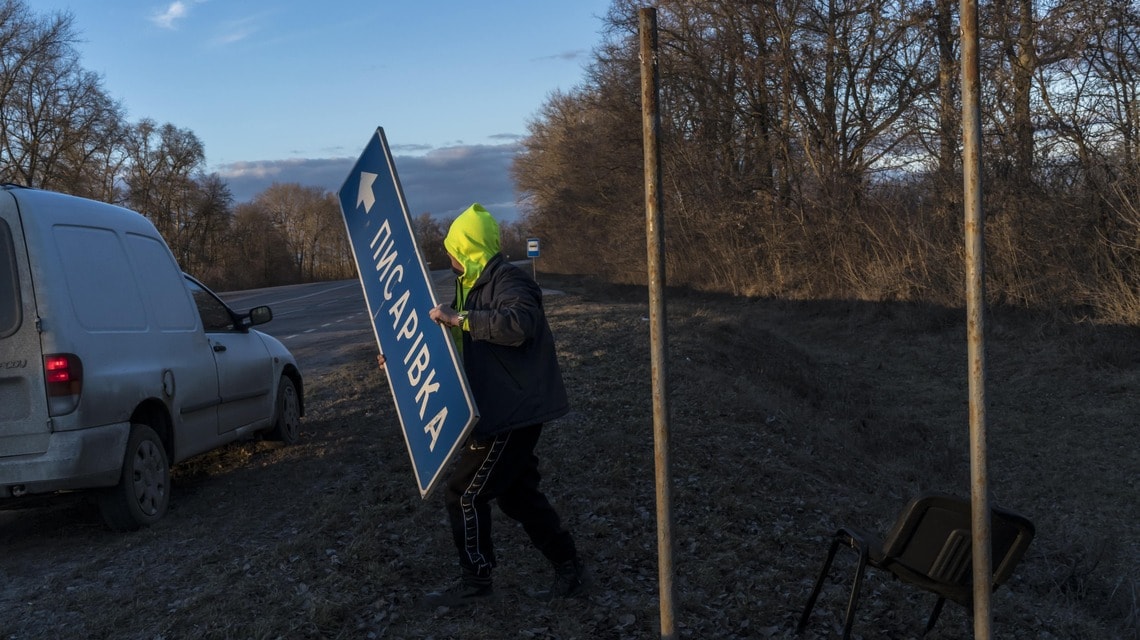ウクライナ「地方の村」で今まさに起きていること 自分の村を守ろうとする村人たちの動き
Once Sleepy and Picturesque, Ukrainian Villages Mobilize for War
While Russian assaults on Ukrainian cities have drawn most of the attention in the war’s early days, civilians in country towns have joined the fight, putting aside the routines of daily village life.
KHOMUTYNTSI, Ukraine — The villagers appeared as silhouettes in the headlights of cars and trucks, a few carrying guns and others clubs, as if they were gangsters roaming the streets.
村人たちの姿は、車やトラックのヘッドライトに照らされてシルエットしか見えなかった。銃器やこん棒を携帯している者も数人おり、その様子はまるで町を徘徊するギャングのようだった。
They were local men and women formed into self-defense units in the villages of the Vinnytsya region in central Ukraine, which had gone silent and dark when the streetlights switched off. They stood by the roadsides, under a very low sky with bright stars.
彼らはウクライナ中部のヴィーンヌィツャ地方の村で自警団を結成した地元の男女たちだ。街灯が消えた後の村は静かで暗かった。星が光り輝く低い空の下、彼らは道路の脇でたむろしていた。

“I am so proud of our people,” said Oksana Mudryk, the mayor of Khomutyntsi village, about 140 miles southwest of Kyiv, Ukraine’s capital. “Our village is so tiny that I was thinking, ‘Do we even have anybody to patrol the streets?’ I thought maybe three guys at most would come to patrol with me. But in one day after the war started in Kyiv, I have signed up more than 30 people.”
「村人をとても誇りに思っています」。そう語るのは、ウクライナの首都キエフから南西に約140マイルのところにあるホムチンツィ村の村長、オクサナ・ムドリクである。「わたしたちの村はとても小さいので、『町をパトロールする人が足りるだろうか?』と心配でした。一緒にパトロールに当たる人が3人いればいい方だと思っていました。しかしキエフで戦争が始まった次の日には、30人以上が集まりました」
Most of the attention in the first days of the war has focused on Ukraine’s large cities, which are the main targets of Russian troop movements and the scene of pitched street battles and deafening artillery attacks. But out in the countryside, a massive grass-roots movement is underway in villages like Khomutyntsi as ordinary Ukrainians — farmers, shop owners, day laborers, taxi drivers — take up arms to join a battle that has abruptly upended their lives.
戦争開始から数日後は、ロシアの主な進軍先となり、激しい市街戦や耳をつんざくような砲撃が繰り広げられているウクライナの大都市部に注目が集まった。しかし、ホムチンツィなどの村をはじめとしたウクライナの地方部では、大規模な草の根の運動が巻き起こっている。農民や店主、日雇い労働者、タクシー運転手などの一般国民が、武器を手に、彼らの日常を突然乱した戦争に次々と加わっているのだ。
The mobilization of civilians to fight against seemingly impossible odds has been one of the distinguishing features of Ukraine’s unexpectedly fierce resistance. And though it may end tragically, Ukrainian officials have been pointing to the effort with pride.
ロシアの侵略に対するウクライナの予想外に激しい抵抗の1つの特徴は、一見無謀に見える戦いに自ら進んで動員される市民たちの存在である。その戦いは悲劇的な最後を迎えるかもしれないが、ウクライナの政府関係者は彼らの努力を誇らしげに称賛している。
“The Russian leadership does not understand that it is at war not only with the armed forces of Ukraine, but with the entire Ukrainian people,” Prime Minister Denys Shmyhal said in a news briefing on Sunday. “And these people have already risen to the liberation struggle, liberation war against occupiers.”
「ロシアの指導部は、彼らがウクライナ軍と戦争しているだけでなく、ウクライナ国民全員と戦争をしていることを理解できていない」とデニス・シュミーガル首相は2月27日の記者会見で述べた。「ウクライナの人々は、自由のための戦いに、侵略者に対する解放戦争のために立ち上がっている」。
Displays of defiance have been recorded across the country. In eastern Ukraine, where Russian armored columns entered towns and villages, some local residents confronted soldiers with angry words. In northern Ukraine, a man knelt briefly in front of a tank. One Ukrainian woman filmed herself on a cellphone taunting a Russian soldier by telling him to put sunflower seeds in his pocket, so that when he died in Ukraine, flowers would grow.
こうした抵抗行為がウクライナ各地で目撃されている。東部では、ロシア軍の機甲部隊が町や村に入り込み、地元住民が怒りの言葉で兵士と対峙する場面が見られ、北部では、戦車の前に一瞬ひざまずく男性も見られた。1人のウクライナ人女性は、ロシア人兵士に「ウクライナで死んだら花が咲くように、ポケットにひまわりの種を入れなさい」と嘲笑する姿を携帯電話で撮影した。
In Khomutyntsi, the big meadow that stretches along the Postolova River is normally a place of leisure. Villagers fish in the river year-round and swim there in the summer. But this weekend the whole village gathered in the meadow to build trenches, a checkpoint and underground shelters.
ホムチンツィのポストロヴァ川沿いに広がる大きな草原は、通常は娯楽の場である。村人たちは一年中この川で釣りをし、夏には泳ぐのだが、この週末は村中の人が草地に集まり、塹壕や検問所、地下に避難所を作った。
Ms. Mudryk drove her car Saturday night to check on her volunteers. She does this several times each night, as patrols keep guard on the roadsides from dusk to dawn.
ムドリクは26日の夜、志願者の様子を見に車を走らせた。夕暮れから明け方にかけての道ばたの見回りのため、毎晩数回、このようなことをしている。
Why would the Russian army come to Khomutyntsi, a cluster of one-story, white-plastered homes, garden plots and dirt roads, with about 400 residents, surrounded by forests and fields? It might seem unlikely. But if Russian troops did arrive, they would not go unnoticed by local people on the watch.
森と畑に囲まれ、平屋建ての白い漆喰の家、庭の区画、未舗装の道、約400人の住民が住むホムチンツィに、ロシア軍がやってくるとは考えられないかもしれない。しかし、もしロシア軍が来たとすれば、地元の見張りが察知するだろう。
“I am crying so much as it is very difficult to get used to our new reality,” Ms. Mudryk said. “But I bow my head in honor to our people. Today, we were asked to bring some help with food to soldiers. In two hours, we loaded a full van of food, just from our village.”
「新しい現実を受け入れるのはつらいことで、涙が出ます」とムドリクは語り、「しかし、わが民に敬意を表し、頭を下げます。今日は、兵士に食料を届ける手伝いをしてほしいという依頼がありました。2時間で、私たちの村からだけで、バン1台分の食料を積み込みました」と語った。
There is bravery, but there is also great fear. Standing on the road in the dark, the mayor pointed at a star in the sky that seemed to be behaving strangely, worried it might be a Russian drone over the village.
勇気もあれば、大きな恐怖もある。村長は暗闇の道路に立ち、ロシアのドローンではないかと心配しながら、奇妙な動きをする空の星を指さした。
Serhiy Osavoliuk, who signed up for patrol duty, said his wife soon followed suit. “My wife, probably thinking of controlling me, signed up as well,” he said. “Now we patrol together.” The pair walk about with flashlights, stopping cars and checking who is inside. Usually, it is just local people.
パトロールに志願したセルゲイ・オサボリウクは、妻もすぐにそれに続いたと話す。「妻は私を抑えたかったのか、一緒に参加しました。今は2人共パトロールにあたっています」と彼は語る。2人は懐中電灯を持って歩き回り、車を止めては中にいる者を確認する。大抵の場合、それは地元住民だけだ。
Scenes like these are repeated in village after village through the countryside. Hundreds of local people helped build fortifications, bringing big sacks from their houses and filling them with sand.
こうした光景は、地方の村々で繰り返されている。何百人もの地元住民らが自宅から持ち寄った大きな袋に砂を詰めて要塞作りを手伝った。
Many of the civilians doing support work, like Mr. Osavoliuk and his wife, are unarmed, though a few have guns or have asked for them. But it seems as if everybody is doing what they can, hoping that even little actions might help.
オサボリウク夫妻のように、支援活動をしている民間人の多くは丸腰だ。銃を所持していたり、あるいは銃を要求していたりする人は少数派である。しかし、少しでも役に立てばと、誰もが自分なりに貢献しているように見える。
The national road agency of Ukraine, for example, issued an order to take down all the road signs — to make it harder for Russian troops to navigate.
例えば、ウクライナの交通当局は、ロシア軍の通行を妨害するために、すべての道路標識を撤去するよう命令を出した。
On the road between the towns of Vinnytsia and Kalynivka, the process had already started, bringing one more, strange new scene on the side of familiar roads. The sign for the village Pysarivka disappeared in just five minutes. Volodymyr, a road service worker, who is 55 and did not want to provide his last name for safety reasons, said he had been driving around tearing down signs. “It is important for them to get lost,” he said of the Russians.
ヴィーンヌィツャとカルィーニウカの間の道路ではすでにその作業が始まっており、見慣れた道路の脇に、また1つ奇妙な光景をもたらした。ピサリフカ村の標識がわずか5分で消えてしまったのだ。安全上の理由から姓を伏せた55歳の道路作業員、ウォロディミルは、看板を撤去するために車を走らせていたという。「彼らを道に迷わせることが重要なのです」と彼はロシア人について語った。
In Kalynivka, which is close to a large weapons depot that Russian troops have targeted, local volunteers wove small strips of cloth together to form a makeshift camouflage net over their checkpoint. Too many people have been clustering around the spot, they said, making it a potential target. The location they chose is next to a bomb shelter, to hide in if bombs start to fall.
ロシア軍が標的としている大規模な武器庫に近いカルィーニウカでは、地元の志願者らが小さな布きれを編んで、彼らが設けた検問所の上にカモフラージュ用のネットを張っている。この地点にはあまりに多くの人々が集まっており、標的になる可能性があるという。検問所に選ばれた場所は空爆から避難するための防空壕に隣接している。
“We came to help our soldiers,’’ said Valentyna Rudenko. “It is hard to believe it is happening to us.”
ヴァレンティーナ・ルーデンコは言う。「私たちは兵士を支援するために来たのです。このようなことが私たちの身に起こっていることが信じられません」。
コメント
コメントを投稿